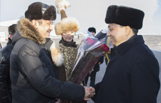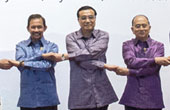Abe coalition secures big Japan election win with record low turnout
(Agencies) Updated: 2014-12-15 11:34PATCHY RECOVERY, WEAK OPPOSITION
Hopes for Abenomics were hit when Japan slipped into recession in the third quarter following an April sales tax rise. Wage increases have not kept pace with price rises and data suggest any economic rebound is fragile.
Highlighting the patchy recovery, big Japanese manufacturers' sentiment worsened slightly in the three months to December but corporate spending plans were strong, the Bank of Japan's closely-watched quarterly "tankan" survey showed on Monday.
Abe decided last month to put off a second tax hike to 10 percent until April 2017, raising concerns about how Japan will curb its huge public debt, the worst among advanced nations.
"Between now and the delayed tax increase, we need to revive the economy and find a path to fiscal rebuilding," said LDP lawmaker Shinjiro Koizumi. "If you think about it in that way, even though we have won, there is no room here for celebrating."
Abe, whose support has now sagged well below 50 percent, called the election after just two years in office to strengthen his grip on power before tackling unpopular policies.
That includes restarting nuclear reactors taken off-line after the 2011 Fukushima disaster and a security policy shift away from post-war pacifism.
The LDP-led coalition victory could ease Abe's path to re-election in a party leadership race next September, boosting the likelihood, but by no means guaranteeing, that he stays in power through 2018 and becomes one of Japan's rare long-term leaders.
The main opposition Democratic Party of Japan (DPJ) won 73 seats, largely due to voters' memories of a 2009-2012 rule plagued by policy flip-flops, infighting and three premiers in three years.
DPJ leader Banri Kaieda, criticised by many in his own camp for lack of charisma, lost his seat. The party's limp performance has raised concerns Japan is returning to one-party dominance that characterised politics for decades - although some analysts said the poor showing of rival mini-parties suggested the opposition could begin to coalesce around the DPJ.
The Japan Communist Party won 21 seats, more than double its strength before the election, gaining support from protest voters loath to back the Democrats.










